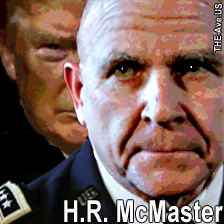

“Dereliction of Duty: Johnson, McNamara, the Joint Chiefs of Staff, and the Lies That Led to Vietnam.”
Some of the chapters in H.R. McMaster’s PhD dissertation include “From Distrust to Deceit,” “A Quicksand of Lies” and “War Without Direction.”
McMaster concluded his study by stating that the Vietnam war was based on deception, and it “was lost in Washington, D.C., even before Americans assumed sole responsibility for the fighting in 1965 and before they realized the country was at war; indeed, even before the first American units were deployed.”
From Living Resistance According to a report, published in 2015, McMaster openly criticized the military-industrial complex and warned about a “narcissistic approach to war.”
Yes, McMaster conjured up Eisenhower and said “the military-industrial complex may represent a greater threat to us than at any time in history.”
The military-industrial complex, he added, “increasingly involves think tanks, and when you see studies that are produced about the future of war or studies that are produced about certain aspects of defense strategy, you ought to look to see who is funding it.”
McMaster didn’t stop at vague generalities but undauntedly provided details about how this corrupt war machine works via manufactured studies in order to be awarded government contracts:
“There is a think tank now, for example, that’s about to publish a report on the future of the Army, and it’s bankrolled by a defense firm whose business model is the integration of high technology capabilities and selling them to the Department of Defense. What do you think that answer is going to be?”
“The future course of war doesn’t depend on what you like to do,” he added, alluding to private contractors who see the State as a source of easy money, at the expense of American lives. Rather, the future of war will revolve around real defense: “It depends on enemy initiatives and enemy reactions.”
The report states that “McMaster urged renewed caution about the military-industrial complex and its influence on how America wages war.”
One think tank, said McMaster, “dusted off the same study, adds a few robots, republishes it every few years and what it says is that personnel are a resource suck on the Department of Defense.” What this shows is that think tanks might be more interested in narcissistic agendas than actually defending national sovereignty.
He also highlighted the fact that investments end up providing capital for these private interests:
“And so where are these investments going in defense right now? They are going into areas that involve really big ticket items, that preserves the large capital transfer to defense industries…”
McMaster commanded troops in Iraq and Afghanistan, served at U.S, Central Command at MacDill Air Force Base in Tampa, earned a doctorate in military history and a Silver Star Medal for battlefield heroics during the first Gulf War.
That McMaster is acutely aware of deception’s role in starting wars is one thing, but that he devoted years to exposing it is a great reflection on McMaster’s character and worldview presuppositions.